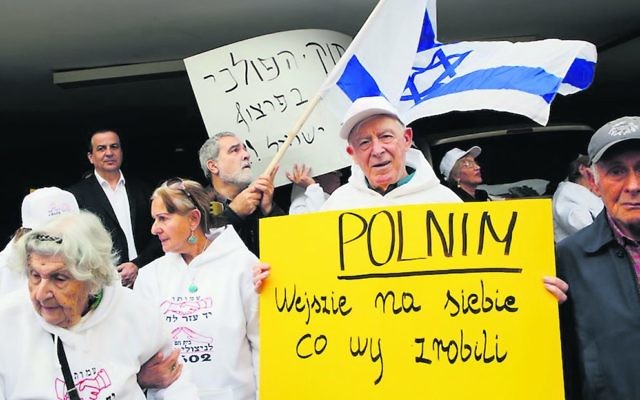Poland backtracks on Holocaust law
Benjamin Netanyahu said that by securing the Polish concession, his team "upheld our prime duty to ensure the historic truth about the Holocaust."

BENJAMIN Netanyahu says he put a stop to Poland’s affront on Holocaust memory – but historians aren’t convinced.
Israel’s Prime Minister triumphantly told the nation that, after discussions, Poland has agreed to “completely rescind” the aspects of its five-month-old law “that caused uproar and distress” in Israel and internationally.
The law prescribed prison sentences for people who describe Nazi camps as “Polish death camps” or who suggest that the Polish nation was complicit in the Shoah. The law remains, but Poland’s parliament, senate and president have eliminated criminal penalties.
Netanyahu said that by securing the Polish concession, his team “stood on guard to protect the truth,” and “upheld our prime duty to ensure the historic truth about the Holocaust.”
But even if the threat is civil action instead of prison time, some Israelis said that the law is still outrageous.
“When it comes to the memory of the Holocaust we don’t negotiate and we don’t accept political compromises,” said Yair Lapid, leader of the Yesh Atid party. “We need to go on, and demand the complete cancellation of this degrading law.”
Jacob Nagel, the professor who Netanyahu tasked with talking to Poland, said that he approached the negotiations as the son of a survivor and with “awe and respect, with the required sensitivity and with no compromise.” He said he achieved “a very good outcome for the people of Israel”.
Netanyahu was pleased with a joint Israeli-Polish statement that was signed – while the top historian Yehuda Bauer called it a document of “betrayal, betrayal, betrayal”.
The statement calls the Holocaust an “unprecedented crime” by Nazi Germany and says that Poland “has always expressed the highest understanding of the significance of the Holocaust as the most tragic part of the Jewish national experience.”
The two countries reject the description of Nazi camps as “Polish,” while agreeing that Holocaust research needs to be free.
But they “reject the actions aimed at blaming Poland or the Polish nation as a whole for the atrocities committed by the Nazis and their collaborators of different nations.”
They “acknowledge and condemn every single case of cruelty against Jews perpetrated by Poles during World War II.” There were “some people” who showed their “darkest side” at the time, “regardless of their origin, religion or worldview”.
Meanwhile, Israel and Poland “are honoured to remember heroic acts of numerous Poles, especially the Righteous Among the Nations, who risked their lives to save Jewish people.”
For Bauer, the emphasis in the statement was wrong. There were not “numerous” rescuers, he said. “Even if we assume that the real figure is 200,000, out of 21 million Poles, that’s only one per cent,” he told a radio interviewer. “What about the other 99 per cent?”
Bauer also lambasted the statement for being so vague about the people who showed their “darkest side”.
“What is ‘regardless of their origin’? Were they born on the moon? It’s Poles, and not one or two,” he said.
Bauer said that Israel was actually giving its seal of approval to a law that will lead to persecution of Polish historians who highlight crimes of Poles among Jews.
Unlike Bauer, Yad Vashem welcomed the Israeli-Polish agreement, calling it a “positive development in the right direction”.
But Efraim Zuroff, the chief Nazi-hunter of the Simon Wiesenthal Centre, told The AJN that he considers the agreement “very flawed”.
“There’s still a way of nationalist and ultra-nationalist to make life miserable for those historians who want to tell the truth about Polish involvement,” he said.
“The previous version said that the Polish prosecution could take people to court and those people could be punished with imprisonment, this clause was removed but it doesn’t prevent private individuals or organisations from suing.”
And with this in place, he predicted, despite official declarations in favour of free scholarship, Polish historians will still self-censor and Holocaust history will suffer.
NATHAN JEFFAY

comments